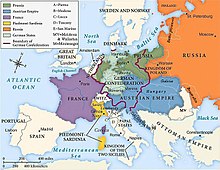European Restoration
| 1815–1849 | |

The national boundaries within Europe as set by the Congress of Vienna, 1815.
|
|
| Including | |
|---|---|
| Preceded by | Napoleonic era |
| Followed by | Romantic era |
| Leader(s) | |
The Concert of Europe, also known as the Congress System or the Vienna System after the Congress of Vienna, was a system of dispute resolution adopted by the major conservative powers of Europe to maintain their power, oppose revolutionary movements, weaken the forces of nationalism, and uphold the balance of power. Historians date its operation from the end of the Napoleonic Wars (1815) to the early 1820s, although some see it playing a role until the Crimean War (1853–1856).
The Concert of Europe was founded by the powers of Austria, Prussia, Russia and the United Kingdom, which were the members of the Quadruple Alliance that defeated Napoleon and his First French Empire. In time, France was established as a fifth member of the Concert, following the restoration of the Bourbon monarchy.
At first, the leading personalities of the system were British foreign secretary Lord Castlereagh, Austrian Chancellor Klemens von Metternich and Tsar Alexander I of Russia. Charles Maurice de Talleyrand-Périgord of France was largely responsible for quickly returning that country to its place alongside the other major powers in international diplomacy.
The age of the Concert is sometimes known as the Age of Metternich, due to the influence of the Austrian chancellor's conservatism and the dominance of Austria within the German Confederation, or as the European Restoration, because of the reactionary efforts of the Congress of Vienna to restore Europe to its state before the French Revolution. It is known in German as the Pentarchie (pentarchy) and in Russian as the Vienna System (Венская система, Venskaya sistema).
...
Wikipedia
